|
| |
| FIRST ANNUAL IAAC LITERARY FESTIVAL |
in collaboration with The South Asia Institute,
Columbia University and India Abroad
NOVEMBER 7-9, 2014
|
|
|
Session 3B
Poetic License : writing contemporary poetry
Moderated by Ravi Shankar
 |
Kirun Kapur
Visiting Indira Gandhi’s Palmist
|
 Kirun Kapur grew up in Hawaii and has since lived and worked in North America and South Asia. Her work has appeared in AGNI, Poetry International, FIELD, The Christian Science Monitor and many other journals and news outlets. She has taught creative writing at Boston University and has been awarded fellowships by The Fine Arts Work Center in Provincetown, Vermont Studio Center and McDowell Colony. Kirun is the winner of the 2012 Arts & Letters/Rumi Prize for Poetry and the 2013 Antivenom prize for her first book, Visiting Indira Gandhi’s Palmist. She is co-director of the popular Boston-area arts program The Tannery Series and is poetry editor at The Drum. Find out more at www.kirunkapur.com. Kirun Kapur grew up in Hawaii and has since lived and worked in North America and South Asia. Her work has appeared in AGNI, Poetry International, FIELD, The Christian Science Monitor and many other journals and news outlets. She has taught creative writing at Boston University and has been awarded fellowships by The Fine Arts Work Center in Provincetown, Vermont Studio Center and McDowell Colony. Kirun is the winner of the 2012 Arts & Letters/Rumi Prize for Poetry and the 2013 Antivenom prize for her first book, Visiting Indira Gandhi’s Palmist. She is co-director of the popular Boston-area arts program The Tannery Series and is poetry editor at The Drum. Find out more at www.kirunkapur.com. |
|
|
| |
| Synopsis |
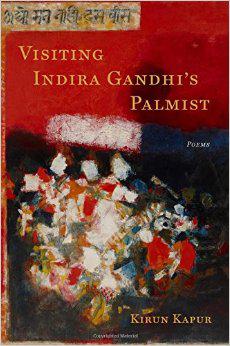 Visiting Indira Gandhi’s Palmist ricochets from Partition-era India to Biblical pastorals, from American bars to the battlefield of the Bhagavad-Gita. By turns lyrical and narrative, unflinching and funny, the collection examines the harrowing collision of love and violence as it arises in families and nations. In these intense, beautiful poems, Kapur introduces us to an astonishing range of characters—mothers and fathers, princes and soldiers, daughters and lovers—as she sets out to explore our most fundamental stories and our most enduring human bonds. Visiting Indira Gandhi’s Palmist ricochets from Partition-era India to Biblical pastorals, from American bars to the battlefield of the Bhagavad-Gita. By turns lyrical and narrative, unflinching and funny, the collection examines the harrowing collision of love and violence as it arises in families and nations. In these intense, beautiful poems, Kapur introduces us to an astonishing range of characters—mothers and fathers, princes and soldiers, daughters and lovers—as she sets out to explore our most fundamental stories and our most enduring human bonds. |
|
Purvi Shah
Terrain Tracks
|
 Purvi Shah furthers the art of transformation as a writer, non-profit consultant, and anti-violence advocate. Author of the award-winning poetry collection, Terrain Tracks, she is the winner of the inaugural SONY South Asian Social Service Excellence Award for her community leadership fighting violence against women. Recently, she shared her poetry at anti-violence conferences and a vigil against sexual violence. She shows creative engagement enables dialogue & change and that art is an essential part of our sacred space. Her book of poetry, Terrain Tracks (New Rivers Press 2006), garnered the Many Voices Project prize and was nominated for the Asian American Writers’ Workshop Members’ Choice Award. In 2013, she was selected as a Poets House Emerging Poets Fellow and her work was nominated for a Pushcart Prize. In 2011, she served as the Artistic Director for Together We Are New York: Asian Americans Remember and Re-Vision 9/11, a community-based poetry project to highlight the voices of Asian Americans during the 10th anniversary of 9/11. In 2010, she received a Jerome Foundation Travel & Study Grant to explore sound vibration in Sanskrit and sound energy in poetry in English. She loves a mean pecan pie and time in city parks. Find her work at http://purvipoets.net or @PurviPoets. Purvi Shah furthers the art of transformation as a writer, non-profit consultant, and anti-violence advocate. Author of the award-winning poetry collection, Terrain Tracks, she is the winner of the inaugural SONY South Asian Social Service Excellence Award for her community leadership fighting violence against women. Recently, she shared her poetry at anti-violence conferences and a vigil against sexual violence. She shows creative engagement enables dialogue & change and that art is an essential part of our sacred space. Her book of poetry, Terrain Tracks (New Rivers Press 2006), garnered the Many Voices Project prize and was nominated for the Asian American Writers’ Workshop Members’ Choice Award. In 2013, she was selected as a Poets House Emerging Poets Fellow and her work was nominated for a Pushcart Prize. In 2011, she served as the Artistic Director for Together We Are New York: Asian Americans Remember and Re-Vision 9/11, a community-based poetry project to highlight the voices of Asian Americans during the 10th anniversary of 9/11. In 2010, she received a Jerome Foundation Travel & Study Grant to explore sound vibration in Sanskrit and sound energy in poetry in English. She loves a mean pecan pie and time in city parks. Find her work at http://purvipoets.net or @PurviPoets.
|
| |
| Synopsis |
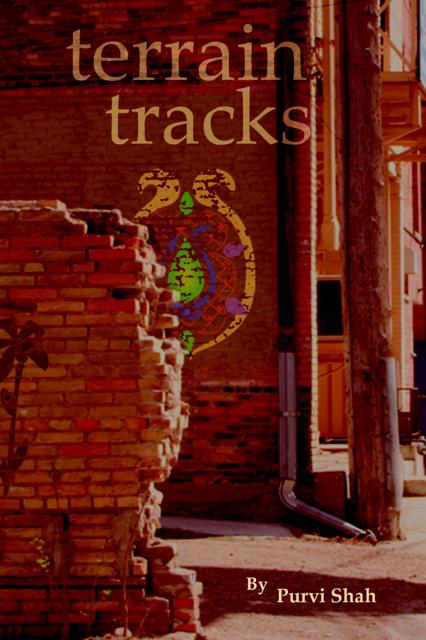 Acclaimed poet Purvi Shah’s debut volume of poetry, Terrain Tracks (New Rivers Press, 2006), won the Many Voices Project prize and was nominated for the 2007 Asian American Writers’ Workshop Members’ Choice Award. Terrain Tracks explores nature, family, travel, and migration, traversing locations such as New York City and India. From ruminations on longing to 9/11, the poems chart landscapes – worlds inner and outer, unspoken and spoken, vibrant and necessary. As noted poetry critic Harriet Davidson observes, “Purvi Shah’s Terrain Tracks explores journeys through space and time in beautifully sensuous lyrics charting the dislocations and locations of immigration, memory, love, and loss...Her vivid images keep the reader near the concrete, making the abstract palpable...The imagination and the body’s touch share the same terrain in these moving poems.” Through tropes of trains and movement, Shah examines what it means to be a 21st-century immigrant woman in the U.S. The book’s structure replicates 16-beat North Indian classical music, celebrating and riffing upon roots. As Soham Patel invokes, “The poems are surprising and much like the spaces they embody, (India, New York) musical in their noise...The musicality of these poems help fugue a hybrid, new amalgamations of language for the song of American Poetry.” Acclaimed poet Purvi Shah’s debut volume of poetry, Terrain Tracks (New Rivers Press, 2006), won the Many Voices Project prize and was nominated for the 2007 Asian American Writers’ Workshop Members’ Choice Award. Terrain Tracks explores nature, family, travel, and migration, traversing locations such as New York City and India. From ruminations on longing to 9/11, the poems chart landscapes – worlds inner and outer, unspoken and spoken, vibrant and necessary. As noted poetry critic Harriet Davidson observes, “Purvi Shah’s Terrain Tracks explores journeys through space and time in beautifully sensuous lyrics charting the dislocations and locations of immigration, memory, love, and loss...Her vivid images keep the reader near the concrete, making the abstract palpable...The imagination and the body’s touch share the same terrain in these moving poems.” Through tropes of trains and movement, Shah examines what it means to be a 21st-century immigrant woman in the U.S. The book’s structure replicates 16-beat North Indian classical music, celebrating and riffing upon roots. As Soham Patel invokes, “The poems are surprising and much like the spaces they embody, (India, New York) musical in their noise...The musicality of these poems help fugue a hybrid, new amalgamations of language for the song of American Poetry.” |
|
Maanav Sachdeva Maasoom
The Sufi’s Garland |
 Manav Sachdeva Maasoom has been writing poetry since he was eleven. His first poem appeared in The Tribune when he was just twelve years old. A Columbia University Master's graduate in Poetry and Policy Studies with a certificate from Harvard Summer Olympia Program in Comparative Literature and European Studies, Maasoom now lives in Kyrgyzstan and works for the Organization for Security and Cooperation in Europe (OSCE) and previously worked with the United Nations. The Sufi's Garland is his debut book. The Sufi's Garland is dedicated to his lifetime inspiration Gurudev Rabindranath Tagore, Emily Dickinson, and Antonio Porschia. Manav Sachdeva Maasoom has been writing poetry since he was eleven. His first poem appeared in The Tribune when he was just twelve years old. A Columbia University Master's graduate in Poetry and Policy Studies with a certificate from Harvard Summer Olympia Program in Comparative Literature and European Studies, Maasoom now lives in Kyrgyzstan and works for the Organization for Security and Cooperation in Europe (OSCE) and previously worked with the United Nations. The Sufi's Garland is his debut book. The Sufi's Garland is dedicated to his lifetime inspiration Gurudev Rabindranath Tagore, Emily Dickinson, and Antonio Porschia.
|
| |
| Synopsi |
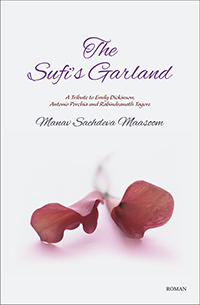 Published in connection with the 150th birth-anniversary of Rabindranath
Tagore, India’s first Nobel Laureate, THE SUFI’S GARLAND is a Fakir’s weave
of words in poetry. The stony hills of Afghanistan forms the backdrop and
one has to listen only to the Sufi’s muse to believe that this howling dry
wind can tune so soulful a music! The reader becomes a sojourner in a
caravan, and the vagrant’s steering-wheel takes him to a painter’s studio to
unfold the mysteries of life. Maasoom’s poems are not scriptures and yet
they bring the reader to ‘a sufibhakt’s fonts in mass rapture with Bhagwan’s
theatre’. As a tribute to Emily Dickinson, Antonio Porchia and Rabindranath
Tagore THE SUFI’S GARLAND is an utterly hypnotic read in its truest sense. Published in connection with the 150th birth-anniversary of Rabindranath
Tagore, India’s first Nobel Laureate, THE SUFI’S GARLAND is a Fakir’s weave
of words in poetry. The stony hills of Afghanistan forms the backdrop and
one has to listen only to the Sufi’s muse to believe that this howling dry
wind can tune so soulful a music! The reader becomes a sojourner in a
caravan, and the vagrant’s steering-wheel takes him to a painter’s studio to
unfold the mysteries of life. Maasoom’s poems are not scriptures and yet
they bring the reader to ‘a sufibhakt’s fonts in mass rapture with Bhagwan’s
theatre’. As a tribute to Emily Dickinson, Antonio Porchia and Rabindranath
Tagore THE SUFI’S GARLAND is an utterly hypnotic read in its truest sense. |
| |
|
Ahsan Akbar
The Devil’s Thumbprint |
 Ahsan Akbar grew up in Dhaka and studied at Exeter. He currently lives in London, and is at work on a novel. His debut collection of poems, The Devil\'s Thumbprint, was launched at the 2014 edition of Hay Festival Dhaka. He reviews for The Dhaka Tribune, The Daily Star, The Telegraph, 3 Quarks Daily, and recently curated literary projects with Granta and Wasafiri. Ahsan Akbar grew up in Dhaka and studied at Exeter. He currently lives in London, and is at work on a novel. His debut collection of poems, The Devil\'s Thumbprint, was launched at the 2014 edition of Hay Festival Dhaka. He reviews for The Dhaka Tribune, The Daily Star, The Telegraph, 3 Quarks Daily, and recently curated literary projects with Granta and Wasafiri. |
| |
| Synopsis |
 The Devil’s Thumbprint is the debut collection by a young Bangladeshi poet. The poems cover a span of years and reflect a young man’s sentimental educationin a world of emotional instability. The metaphor of love as terrorism, as something simultaneously dangerous—even illicit or illegal—and thrilling, runs through these poems of love and love lost: hearts of rock flinting sparks, bodies breaking apart like continents, and euphemism both dolled up and stripped bare. At once emotionally charged and infused with irony and wit, the poems will delight and entertain and also provoke serious thought. The Devil’s Thumbprint is the debut collection by a young Bangladeshi poet. The poems cover a span of years and reflect a young man’s sentimental educationin a world of emotional instability. The metaphor of love as terrorism, as something simultaneously dangerous—even illicit or illegal—and thrilling, runs through these poems of love and love lost: hearts of rock flinting sparks, bodies breaking apart like continents, and euphemism both dolled up and stripped bare. At once emotionally charged and infused with irony and wit, the poems will delight and entertain and also provoke serious thought. |
|
Yena Sharma Purmasir
Until I Learned What It Meant
|
 Yena Sharma Purmasir is a 22 year old writer and poet. Born and raised in New York City, Purmasir\'s work has been featured in several literary magazines, including The Freshet, published by the Fresh Meadow Poets, and Kalyani Magazine, while also appearing in cultural newsletters, like India Abroad. Her poems are regularly featured on the Where Are You Press tumblr page. She held the title of Queens Teen Poet Laureate for the 2010-2011 calendar year. Her first book of poetry, Until I Learned What It Meant, was published by Where Are You Press in 2013. Purmasir graduated from Swarthmore College in 2014, where she majored in Psychology and double minored in English Literature and Religion Studies. She is currently engaging in a year\'s worth of service in the New York City Civic Corps program, working as the Volunteer Coordinator at Hour Children, Inc. She hopes to return to the world of academia to pursue a doctorate degree in Clinical Psychology in the very near future. Yena Sharma Purmasir is a 22 year old writer and poet. Born and raised in New York City, Purmasir\'s work has been featured in several literary magazines, including The Freshet, published by the Fresh Meadow Poets, and Kalyani Magazine, while also appearing in cultural newsletters, like India Abroad. Her poems are regularly featured on the Where Are You Press tumblr page. She held the title of Queens Teen Poet Laureate for the 2010-2011 calendar year. Her first book of poetry, Until I Learned What It Meant, was published by Where Are You Press in 2013. Purmasir graduated from Swarthmore College in 2014, where she majored in Psychology and double minored in English Literature and Religion Studies. She is currently engaging in a year\'s worth of service in the New York City Civic Corps program, working as the Volunteer Coordinator at Hour Children, Inc. She hopes to return to the world of academia to pursue a doctorate degree in Clinical Psychology in the very near future. |
| |
|
Synopsis |
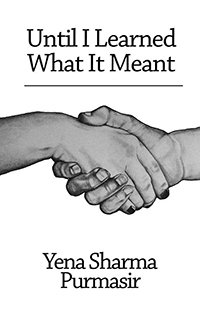 Until I Learned What It Meant is Yena Sharma Purmasir\'s first book of poetry. The book is divided into three parts, weaving together themes of racism, sexism, body image, and overarching themes of love: love of the self, romantic love, love of tradition, and love for god. The poems in the book span a large expanse of time, with some written as early as when Purmasir was 15 and others are more recent, written months before publication when she was 20. In general, Until I Learned What It Meant is about how we learn to understand the layers of life, what meaning we prescribe and how all things change over time. Ultimately, these are personal poems, that are not specific to Purmasir alone. These are life poems. They are for all of us who are still learning. Until I Learned What It Meant is Yena Sharma Purmasir\'s first book of poetry. The book is divided into three parts, weaving together themes of racism, sexism, body image, and overarching themes of love: love of the self, romantic love, love of tradition, and love for god. The poems in the book span a large expanse of time, with some written as early as when Purmasir was 15 and others are more recent, written months before publication when she was 20. In general, Until I Learned What It Meant is about how we learn to understand the layers of life, what meaning we prescribe and how all things change over time. Ultimately, these are personal poems, that are not specific to Purmasir alone. These are life poems. They are for all of us who are still learning. |
|
| |
| Ravi Shankar |
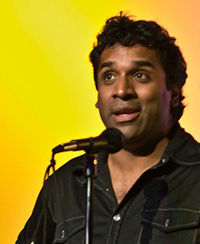 Ravi Shankar is the founding editor and Executive Director of Drunken Boat, one of the world’s oldest electronic journals of the arts. He has published or edited seven books and chapbooks of poetry, including the 2010 National Poetry Review Prize winner, Deepening Groove. Along with Tina Chang and Nathalie Handal, he edited W.W. Norton’s Language for a New Century: Contemporary Poetry from Asia, the Middle East & Beyond, called “a beautiful achievement for world literature” by Nobel Laureate Nadine Gordimer. He has won a Pushcart Prize, been featured in The New York Times and the Chronicle of Higher Education, appeared as a commentator on the BBC and NPR, received fellowships from the MacDowell Colony and the Connecticut Commission on the Arts, and has performed his work around the world. He is currently Chairman of the Connecticut Young Writers Trust, on the faculty of the first international MFA Program at City University of Hong Kong and a Professor of English at CCSU. Ravi Shankar is the founding editor and Executive Director of Drunken Boat, one of the world’s oldest electronic journals of the arts. He has published or edited seven books and chapbooks of poetry, including the 2010 National Poetry Review Prize winner, Deepening Groove. Along with Tina Chang and Nathalie Handal, he edited W.W. Norton’s Language for a New Century: Contemporary Poetry from Asia, the Middle East & Beyond, called “a beautiful achievement for world literature” by Nobel Laureate Nadine Gordimer. He has won a Pushcart Prize, been featured in The New York Times and the Chronicle of Higher Education, appeared as a commentator on the BBC and NPR, received fellowships from the MacDowell Colony and the Connecticut Commission on the Arts, and has performed his work around the world. He is currently Chairman of the Connecticut Young Writers Trust, on the faculty of the first international MFA Program at City University of Hong Kong and a Professor of English at CCSU. |
| |
|
|
|

